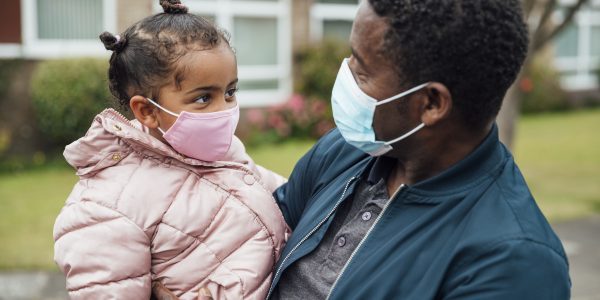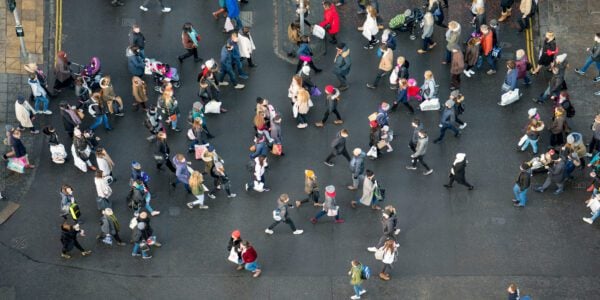
07/06/22
3 min read
A meaningful ‘levelling up’ agenda cannot be limited to new tech hubs and hanging baskets on high streets, and should focus instead on improving town centres, connectivity and the quality of low-skilled jobs, according to the Resolution Foundation.
All over the place – the 22nd report for The Economy 2030 Inquiry, a collaboration with the LSE, funded by Nuffield Foundation – brings together focus group research (which took place in Leeds, Barnsley, Hull and Scarborough) and data analysis to explore what people think about the economic challenges that different places in Britain face, and what closing gaps between places should mean.
A key shared sentiment was that people have both a strong sense of pride in their local area, and a belief that things should be better. This tallies with polling showing that in every region of England, at least three-quarters of people say that their place has either trodden water or deteriorated in recent years.
However, people have a realistic economic vision for their place. Rather than expect their local area to become a new economic hub, participants said that large-scale economic development – and the diverse range of jobs and higher pay that it leads to – would naturally cluster around large cities like Leeds and Manchester.
For people living in Leeds, the desire for more investment to bring new opportunities was mixed with concern that it could also drive greater inequality and higher housing costs (as London has demonstrated). Participants noted that rents were already surging, and that new builds in the city did not seem to match local need.
For people living outside major cities, participants said that good connectivity was crucial to maximise the spill-over economic gains they might experience from additional investment in places like Manchester and Leeds.
This view that Britain’s major cities outside London are poorly served by public transport, and that the car is still king when it comes to commuting, particularly in smaller towns, was widely shared.
This view is backed up by the evidence, says the Resolution Foundation, which finds that people living in core cities (like Leeds and Manchester) can get to seven times more jobs in a 30-minute commute by car than if they commute by public transport. In smaller towns, using a car means being able to access 28 times as many jobs.
If local and national government want to change this practice of car-reliance and encourage greater use of public transport – which is critical to improving the economic size of cities – then improvements will need to be done at scale, says the Resolution Foundation.
As well as accessing jobs, the quality of work was a major concern, with participants saying that low- skilled work often meant casual employment, low pay and a lack of training or progression.
The prevalence of low-quality work in smaller towns – 30% of jobs in Scarborough are elementary or care roles, compared to 17% in Leeds – helps to explain why over a third of 18-year-olds from small towns or villages leave their home area – more than twice the rate of those living in large cities. However, rather than seeing this as a bad thing, participants saw this outward migration as a positive trend, helping young people to gain new skills and earn better pay.
The real problem, says the Foundation, is not that young people are choosing to leave their home area to further their careers, but that those from deprived areas are less than half as likely to do so as those from affluent areas. The mobility barriers for young people in deprived areas – including poorer quality schools – must be overcome, it says.
Finally, while the evidence and views from participants show that the priorities for levelling up will need to vary according to place – from affordable housing in major cities, to better transport links in cities’ hinterlands, and better working conditions in further-afield towns – all pointed to the importance of their local town or city centre as an economic hub.
In practice this means giving people a reason – and means – to visit their local centre, either for work or leisure by, for example, reducing the rate of empty high street shops, building more homes in centres or improving transport links.
Lindsay Judge, Research Director at the Resolution Foundation, said:
“There is as much support for ‘levelling up’ across Britain as there is confusion about what it actually means. Crucially, closing economic gaps between places means different things to different areas – from making it affordable to live in major cities, practical to commute into them from nearby towns, and possible to enjoy decent, well-paid work irrespective of where you live.
“Successfully closing economic gaps between places is the right thing to, but it will involve tough trade-offs over where to prioritise investment, and where decisions are ultimately made.
“The good news is that people understand these trade-offs far more than politicians give them credit for, so there is no excuse not to face up to these challenges and give place far more prominence in a new economic strategy for Britain.”
“People’s pride in and connection with their local area is evident from this research. However, it is also clear that people’s hopes for the future of their areas will not be met without meaningful investment to improve town centres, better transport links and more, quality low-skilled jobs. Efforts to reduce geographical disparities should also be supported by action to address other persistent inequalities in the UK, including those related to age, gender and ethnicity. People everywhere should have a fair opportunity for a healthy life and good access to education, public services and employment opportunities.”Alex Beer, Welfare Programme Head at the Nuffield Foundation










































